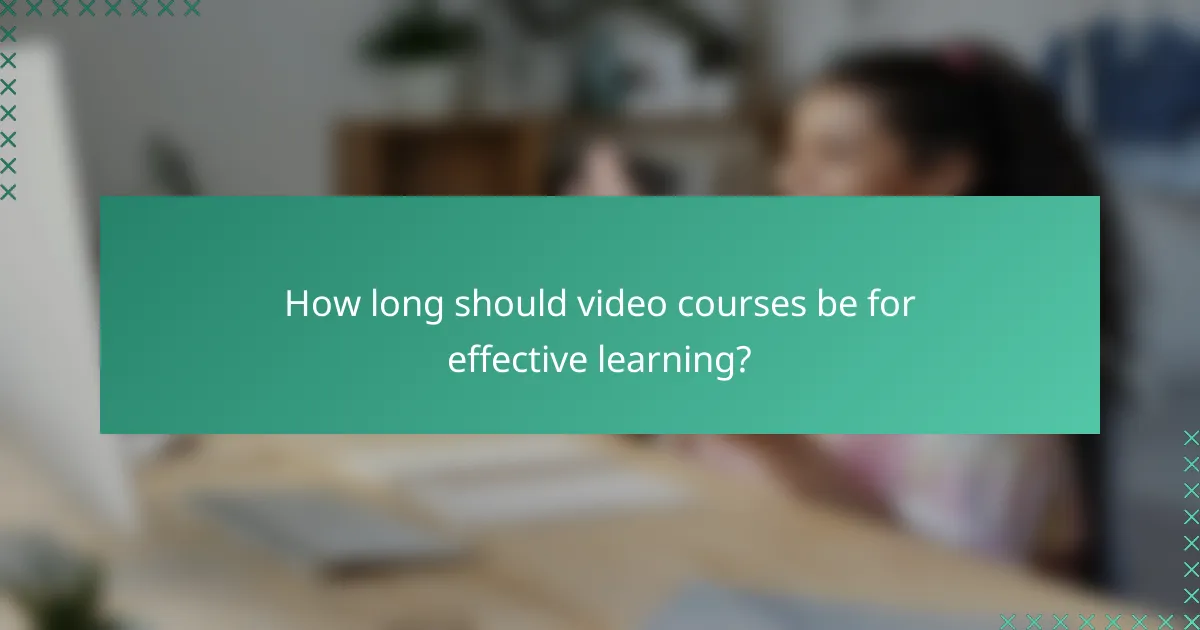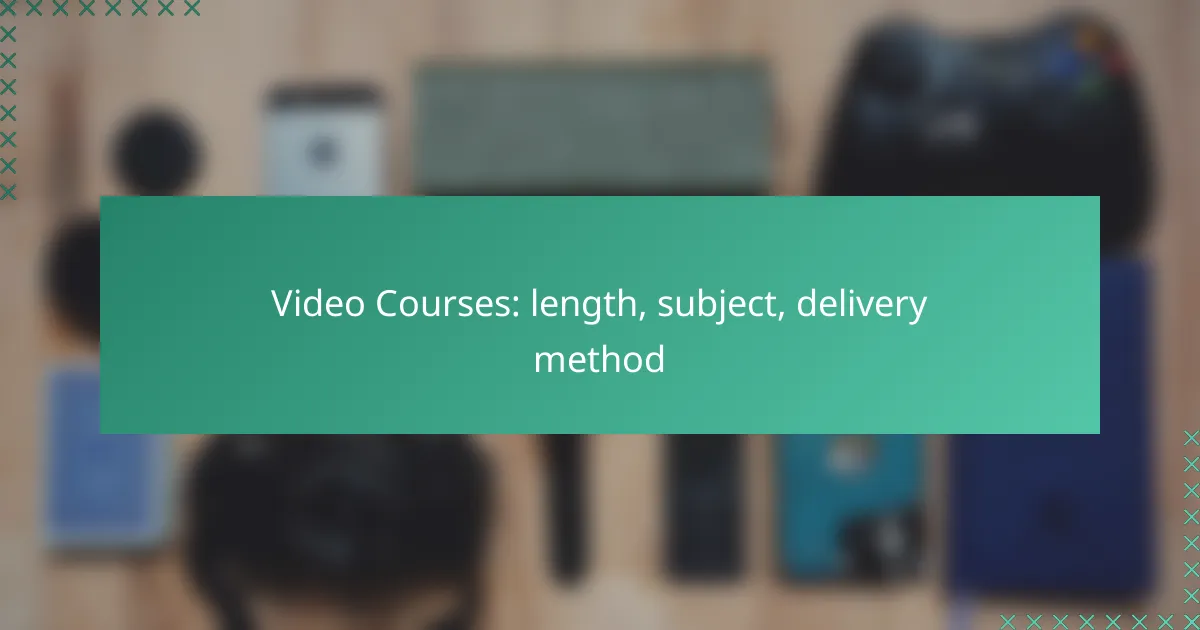Video courses have become a popular educational tool, offering various delivery methods such as live online classes, pre-recorded lectures, and hybrid models to suit diverse learning preferences. The ideal course length often balances engagement with depth, as shorter courses can enhance focus while longer ones may provide comprehensive insights. In the UK, subjects like technology, business, health, and creative arts are particularly sought after, attracting learners eager to develop their skills or change career paths.

What are the best video course delivery methods in the UK?
The best video course delivery methods in the UK include live online classes, pre-recorded video lectures, hybrid models, and mobile-friendly platforms. Each method offers unique advantages and considerations that cater to different learning preferences and schedules.
Live online classes
Live online classes involve real-time instruction where students interact with instructors and peers via video conferencing tools. This method fosters engagement and allows for immediate feedback, making it ideal for subjects that benefit from discussion and collaboration.
When considering live classes, check the schedule to ensure it fits your availability, as sessions are typically held at specific times. Look for platforms that offer interactive features like polls and breakout rooms to enhance the learning experience.
Pre-recorded video lectures
Pre-recorded video lectures allow students to learn at their own pace by accessing content whenever they choose. This flexibility is beneficial for those with busy schedules or varying time zones, as learners can pause, rewind, and revisit material as needed.
When selecting pre-recorded courses, consider the length of the videos and the overall course duration. Aim for lectures that are concise, ideally between 10 to 30 minutes, to maintain engagement and facilitate easier retention of information.
Hybrid models
Hybrid models combine both live and pre-recorded elements, offering a balanced approach to learning. Students can attend live sessions for discussions while accessing recorded lectures for foundational knowledge, catering to diverse learning styles.
When opting for hybrid courses, ensure that the live components are well-integrated with the recorded materials. This approach can enhance understanding and retention, as students can apply what they learn in real-time discussions.
Mobile-friendly platforms
Mobile-friendly platforms enable learners to access video courses on smartphones and tablets, making education more accessible. This method is particularly useful for those who prefer to study on the go or have limited access to traditional computers.
When choosing a mobile-friendly platform, look for apps that allow offline viewing and have user-friendly interfaces. Ensure that the content is optimized for smaller screens to enhance the learning experience without compromising quality.

How long should video courses be for effective learning?
Video courses should ideally be tailored to the subject matter and the target audience, balancing engagement and information retention. Generally, shorter courses can enhance focus, while longer courses may provide deeper insights but risk losing viewer attention.
Short courses (under 30 minutes)
Short courses, typically lasting under 30 minutes, are effective for quick learning and skill acquisition. They are ideal for introducing new concepts or providing concise tutorials on specific topics.
These courses often employ engaging visuals and interactive elements to maintain viewer interest. Consider using them for subjects that require immediate application, such as software tips or brief overviews.
Medium-length courses (30-90 minutes)
Medium-length courses, ranging from 30 to 90 minutes, strike a balance between depth and engagement. They allow for more comprehensive coverage of a topic while still keeping the learner’s attention.
These courses are suitable for subjects that benefit from a structured approach, such as foundational knowledge in a field or practical skills development. Incorporating quizzes and discussions can enhance retention and understanding.
Long courses (over 90 minutes)
Long courses, exceeding 90 minutes, are best for in-depth exploration of complex subjects. They provide ample time for detailed explanations, case studies, and extensive examples.
While these courses can offer significant value, they require careful planning to maintain engagement. Breaking them into modules with breaks or interactive segments can help prevent viewer fatigue and improve learning outcomes.

What subjects are most popular for video courses in the UK?
In the UK, the most popular subjects for video courses include technology, business, health, and creative arts. These areas attract a wide range of learners seeking to enhance their skills or pivot their careers.
Technology and programming
Technology and programming courses are highly sought after, reflecting the growing demand for digital skills. Topics often include web development, data science, and cybersecurity, with many courses ranging from beginner to advanced levels.
When selecting a course, consider the programming languages or technologies that are currently in demand, such as Python or JavaScript. Look for courses that offer hands-on projects to apply your learning practically.
Business and marketing
Business and marketing video courses cover essential skills like project management, digital marketing, and entrepreneurship. These courses are designed to help learners understand market trends and develop strategies to succeed in various industries.
For effective learning, choose courses that provide case studies and real-world applications. Many platforms offer certifications that can enhance your CV and demonstrate your expertise to potential employers.
Health and wellness
Health and wellness courses focus on personal development, fitness, nutrition, and mental health. These subjects appeal to individuals looking to improve their lifestyle or pursue a career in health-related fields.
Consider courses that include practical components, such as guided workouts or meal planning. Certifications in areas like personal training or nutrition can also be beneficial for those seeking professional opportunities.
Creative arts and design
Creative arts and design courses encompass a variety of topics, including graphic design, photography, and music production. These courses attract individuals interested in expressing their creativity and developing artistic skills.
When choosing a course, look for those that offer portfolio-building opportunities or access to industry-standard software. Engaging with community projects or competitions can also enhance your learning experience and visibility in the field.

What criteria should you consider when choosing a video course?
When selecting a video course, consider the instructor’s qualifications, course reviews and ratings, and the learning outcomes and objectives. These factors significantly influence the course’s quality and your overall learning experience.
Instructor qualifications
Instructor qualifications are crucial as they reflect the expertise and credibility of the course content. Look for instructors with relevant degrees, certifications, or extensive experience in the subject area.
Additionally, consider their teaching style and delivery method. Some instructors may offer engaging presentations, while others may focus more on theoretical aspects. Watching introductory videos can help gauge their teaching effectiveness.
Course reviews and ratings
Course reviews and ratings provide insight into the experiences of previous learners. High ratings and positive feedback often indicate a well-structured course that meets student expectations.
Check multiple platforms for reviews to get a balanced perspective. Look for comments on course content, instructor interaction, and overall satisfaction. Be cautious of courses with few reviews, as they may lack credibility.
Learning outcomes and objectives
Clearly defined learning outcomes and objectives help you understand what you will achieve by the end of the course. Look for courses that outline specific skills or knowledge you will gain.
Consider whether the course aligns with your personal or professional goals. For example, if you aim to acquire a new skill for a job, ensure the course covers relevant topics and practical applications.

How do pricing models differ for video courses?
Pricing models for video courses vary significantly, impacting how learners access content. The main types include subscription-based pricing, one-time purchase pricing, and freemium models, each offering distinct advantages and considerations for both providers and users.
Subscription-based pricing
Subscription-based pricing allows users to pay a recurring fee to access a library of video courses. This model often includes monthly or annual payments, providing flexibility and a wide range of content for learners.
Considerations include the total cost over time and the value of the content offered. For example, a subscription might range from $10 to $50 per month, depending on the platform and course variety. Users should evaluate whether they will utilize the service enough to justify the ongoing expense.
One-time purchase pricing
One-time purchase pricing involves a single payment for lifetime access to a specific course. This model is straightforward, allowing learners to own the course without ongoing fees.
Prices for one-time purchases typically range from $20 to several hundred dollars, depending on the course depth and subject matter. It’s essential for buyers to assess the course content and instructor credibility before committing, as this investment is non-recurring.
Freemium models
Freemium models offer basic course access for free, with optional paid upgrades for advanced features or additional content. This approach attracts a broad audience while providing a pathway to monetization.
Users can explore introductory materials without financial commitment, but should be aware that premium content may require significant investment later. For instance, while basic access might be free, advanced modules could cost anywhere from $30 to $200. Learners should consider their long-term goals when engaging with freemium offerings.

What platforms offer video courses in the UK?
Several platforms provide video courses in the UK, catering to a wide range of subjects and learning styles. Popular options include Udemy, Coursera, and LinkedIn Learning, each offering unique features and pricing structures.
Udemy
Udemy is a well-known platform that offers a vast selection of video courses across various subjects, from programming to personal development. Courses are created by independent instructors, allowing for a diverse range of teaching styles and content quality.
When using Udemy, consider the course length, which can vary significantly from a few hours to several weeks, depending on the topic. Pricing is flexible, with many courses available for under £50, and frequent discounts can make learning more affordable.
To maximize your experience, look for courses with high ratings and reviews. Avoid enrolling in courses with few or no reviews, as they may not meet your expectations. Additionally, take advantage of Udemy’s lifetime access policy, allowing you to revisit course materials whenever needed.
